- Home
- Tim Lebbon
Pieces of Hate Page 5
Pieces of Hate Read online
Page 5
“Feed your hate,” he said. Then, with something that might have been a cackle or a cough, he turned and disappeared into the forest.
Gabriel ran. The words stuck, but subconsciously. Right then all he knew was the fear, stench and cries of the dying village.
Gabriel sprang awake, feeling instantly sick. He sniffed to test whether that smell of burning was still there. It was not, but for a moment he wished it would return. Horrible though it was, at least it was familiar. The smells here now were of rot and salt, wet rope and sickness, bilge water and hopelessness. All unfamiliar apart from the hopelessness, and that aimless stench exuded from him. After all these years even revenge had begun to grow stale.
He sat up slowly on his rough cot, rubbing his eyes, looking around, and his cleared vision only made everything look worse. His scars itched, and there were many of them. Phantom wounds stabbed at him, too—his chest, his leg, his eye—and he wondered whether they were injuries yet to be suffered. His throat was parched. His stomach churned with the sway and roll of the boat, the pitch and yaw, and if he closed his eyes it seemed that he was moving in every direction at once. He felt thoroughly wretched. Gabriel had chased that bastard demon across the world and back again, and not for the first time he wondered whether it was time to give in. But something inside, far deeper than he could delve, would never allow that.
“Bad dreams?” a voice asked from the darkness. Gabriel remembered that he was not the only passenger on this journey, and he wondered what he had been mumbling in his sleep.
“Always,” he said.
“I try not to sleep.” The tall clergyman came out of the shadows, face like a wolf’s, eyes of a lamb. “These are pirates aboard this ship. They’d slit my throat for my cross as soon as look at me. I’ve seen it in their eyes.”
“Isn’t that distrustful for a man of God?” Gabriel asked.
“Why do you think I should trust anyone?” The man chuckled in the dark, and his laugh slipped into a yawn.
“If they were that keen for your cross, they’d slit your throat while you were awake.” The clergyman fell silent and Gabriel stood, grabbing onto the low ceiling supports for balance. “Any idea where we are?”
“Somewhere between Portsmouth and Port Royal.”
“Thank you. Most helpful.” Gabriel snorted, spat and made his way out of the cabin and up on deck.
As soon as he hit fresh air the sickness rose in him, as if drawing all the bad stuff up and out of his guts. He staggered to the railing and vomited into the sea. He heaved again and again, leaving spreading slicks on the sea’s surface behind them, alive with the movement of small fish. The pain finally eased away and he closed his eyes, but the dream was still fresh in his mind. Too soon he was running through the forest again, knowing what he would find.
“Food not to your liking?”
Gabriel turned slowly to see Captain Parker standing a few steps away, feet planted apart, hands clasped behind his back. He remained vertical whichever way the ship dipped or swayed, and concentrating on his face went some way to calming Gabriel’s rebellious stomach.
“I’ve barely tried it yet,” he said.
“You should! It’ll make you feel better. And we’ve days to go. No point getting to Port Royal and having to do . . . whatever it is you’ve got to do . . . on an empty stomach.”
“I’ll eat soon,” Gabriel said.
The captain stepped closer, and Gabriel smelled the blackness of rotten teeth. “You don’t look like a privateer to me,” Parker whispered.
“And what does a privateer look like?”
“Wild. Free. Your eyes are filled with purpose, and yet you’re trapped.”
“Trapped?” Gabriel scoffed, but he thought, Is it so bloody obvious?
“Aye. Trapped by whatever it is you seek in Port Royal. It’s not a good place, you know. Most who go there make their fortune then find their doom with the next breath.”
“I’m not much concerned with either,” Gabriel said.
The captain looked him up and down, gaze resting on Gabriel’s visible scars. In return, Gabriel made his own assessment. The captain was young—maybe twenty-five—and he carried his own scars like medals. A badly healed cut above his right eye, flesh and skin knotted and black. A burn to his scalp, pink and smooth and hairless. And on his chest, on display behind his open shirt, a wound that looked as though someone had once attempted to gouge out his heart.
“What happened to the man that did that?” Gabriel asked, pointing to the deep wound.
“Man?” the captain shouted; then he coughed a rancid laugh into Gabriel’s face. “One of Port Royal’s whores did that! Would you believe that, stranger? I’d screwed her to the bed, and afterwards while I slept she took my own dirk and had at me!” He paused, glaring at Gabriel as if challenging him to doubt the story.
“She didn’t like pirates?” Gabriel said.
The captain’s smile dropped, but only for a second. Gabriel had the impression it was a permanent lifeless fixture, like a ship’s figurehead. He was probably even smiling when he awoke to find the whore excavating his chest.
“She doesn’t anymore,” Parker said. “I throttled her, and made sure I had my money’s worth while doing it. She died slow.”
Gabriel shrugged. “Self-defence.”
The captain’s smile slipped again. He roared a painfully false laugh and clapped Gabriel across the shoulders. “You’re a one!” he shouted. “Hey, Burton, have you spoken with this passenger? He’s a one, for sure!” A big man looked up from where he was patching an area of broken decking, shook his head, went back to work. “That’s Burton,” Captain Parker said. “Carpenter. Very good at cutting off arms and legs, if the battle’s been a bad one. Worth his weight in pieces of eight. He’s been with me almost six months now, he was carpenter aboard a Royal Navy ship I took, and—”
“I don’t care,” Gabriel said. He was taking a risk, he knew, belittling this madman’s opinion of himself. But it was true; he did not care. “Port Royal’s my destination, I don’t mind how I make it.”
“And why are you going?” Parker asked. “You carrying something precious? Something I might like to see?”
“The clothes I stand in, and these,” Gabriel said, shifting his jacket aside. The captain glanced down at the cutlass and knives in his belt, and the two pistols sitting in holsters crossed on his chest.
“Now there’s a pretty pair,” he said. “May I?”
Gabriel kept his jacket open.
The captain gingerly lifted one of the pistols from Gabriel’s chest and weighed it in one hand. He examined the gold-inlaid handles, the doghead cast in the image of a lion, and the signs of filed-down engravings along the pistol’s barrel. “A beauty,” he said. “Left-hander, too. Very nice. Very expensive. Not yours.”
“Not mine.”
“So where did you get these?”
“A man in Portsmouth gave them to me.”
“‘Gave them,’ eh? ‘Gave’? Right. Right!” The captain returned the pistol to Gabriel and walked away, forcing out his huge, false laugh once again. Few of the crew seemed to be paying much attention; Gabriel guessed they were used to the sound.
He went back below deck, breathing hard. It had been a risk showing the pistols, but he also felt that he had gained the captain’s respect, for a while at least. If the pirate thought Gabriel had killed someone for these weapons, all the better for him.
Gabriel had no fear of an attack from these privateers. There was little they could do that would hurt him more. He simply wanted a quiet journey, during which he could reflect on what might come once he reached Port Royal. There had been a rumour of a “strange man with many faces” leaving Portsmouth on a Caribbean-bound Royal Navy ship, and talk of a killer sent to finish Captain Henry Morgan. Nothing more than that. Just two disparate clues that could converge to say: Temple.
All this way for a rumour, Gabriel thought. But mostly he knew when he was going in the right direction.
His wounds hurt more the nearer he came to Temple, and his scars were itching more and more now, as if reliving the violence that had caused them. His left eye, too, and his leg, places as yet untouched by Temple’s anger. Strange.
“You were talking to the captain,” the clergyman said back in the cabin. “He was laughing. What did he say?”
“Not much.” Gabriel flashed his pistols to the preacher. “Just pirate talk.”
Later that day Gabriel watched as the clergyman fell asleep. He had tried to remain awake, desperately biting his lip, pinching the back of his hand, shouting and singing and cursing in ways no man of God ever should. But eventually utter exhaustion took him, reaching out to drag him down into a nightmare-haunted unconsciousness. Gabriel remained motionless for a few minutes as the man began to mutter and snore; then he quietly left the cabin and closed the door behind him. He could not wait forever. If he returned later and found the clergyman murdered for his cross, that would not be Gabriel’s concern. He had no time in his life for responsibility; that had been slaughtered along with his family six centuries before.
On deck, the night was beautiful. Gabriel noticed beauty more than ever before, but only because it was something he would never be a part of again. The sea was placid, with only a regular swell gently swaying the masts. The trade wind carried them onward, heavy enough to fill the sails, not so heavy as to cause discomfort. A bank of cumulus clouds hung at the horizon behind them, lightning dancing through its insides and illuminating the tips of waves. Stars speckled the clear sky above, and the moon hung almost full, silvering the deck.
Six hundred years and two thousand miles away, the bones of his wife felt only the cold compress of earth, the slither of underground creatures, and they would never see the light again.
Gabriel made his way along the deck of the brigantine to the forecastle, stepping over sleeping sailors, careful not to tread on an outstretched hand or kick a cutlass. Night was a time for fear, and these men’s reactions to a stranger walking among them could only be violent.
He reached the forecastle, climbed the short ladder and stood at the railing. There were signs that major structural work had been carried out here—stumps of timber bracings displayed the lighter scars of recent sawing—and Gabriel wondered just how long Captain Parker had run this ship.
“It’s not safe to be out here at night.”
Gabriel turned around, startled, only to be met by the cool kiss of metal to his throat.
“Y’see, there are some cutthroats on this ship. Good men all, but they’d kill you for a bottle of rum.” The captain pressed harder and Gabriel leaned back against the railing. He heard the timber creak, and wondered just how sound the new carpentry work was. Even what had happened to him all those centuries ago would not save him from the cold clasp of the Atlantic.
“Thanks for the warning,” Gabriel said. He could feel the cool trickle of his blood finding the night. It ran inside his shirt, such a secret touch.
Captain Parker said nothing for a while, just stood there with his cutlass pressed to Gabriel’s throat. He leaned in close so that the rot of his mouth was apparent. He smelled of decaying meat, as if he were dying from the inside out. Gabriel thought of the dirk on his belt, and the captain’s smile suddenly widened.
“I don’t much like you,” Parker said. “You confuse me, and I don’t like being confused. I like to know who’s on my ship, and why. So you have a tale to tell, stranger. Only make sure I believe it, or I’ll open your throat and push you overboard. Now, I’ve killed enough men to know the smell of them just before they die. Cowards shit themselves. Brave men stink of rage and fight, and I respect that. You . . . your stench is something I’ve never known before. And that’s another thing I don’t like about you.”
“I can’t help how I smell,” Gabriel said.
The captain’s smile remained, his four teeth reflecting moonlight. “Make your choice, stranger. Tell me your tale or take a swim.”
“There is no choice,” Gabriel said. “I’ll tell you where I’m going and why. It’s no secret.”
“Then why doesn’t anyone know?”
“I just don’t like people.”
The captain froze for a second, then uttered what sounded like a real chuckle. He stepped back and lowered his cutlass, keeping it at his side in case Gabriel decided to fight.
“I’m going to kill a man,” Gabriel said, thinking, though he’s nowhere near a man. That was something this captain did not need to know, and would not understand if he did.
“That much I’d already decided for myself.”
“That’s all there is,” Gabriel said.
“Why are you going to kill him?”
“Revenge.”
“Your own?”
“Yes. He killed my family.” And I’m charged to kill him. It’s my mission in what’s left of existence. But that was something even Gabriel barely understood.
“Where?”
Gabriel stared over Captain Parker’s shoulder, into the distant night. “Wales,” he said. “A long time ago.”
The captain chuckled again. “At least you have honest business here, unlike your cabinmate.”
“I don’t even know him.”
“His name’s Sparks. He’s doing nothing but running away.”
“From what?” Gabriel asked.
“Now, if I went around shouting about other people’s business, maybe your man would be forewarned,” the captain said. “There’s such a thing as privacy, and I’ll honour that. But I still don’t like you, stranger. You have a smell I don’t know, and a look in your eye . . . like a snake. You’re a worrying son of a bitch, and you carry a cloud of doom with you.”
“Then throw me overboard,” Gabriel said.
The captain laughed, the loud false roar once again. “A brave cur, too! No, I’ll keep you on board, if you don’t mind. You confuse me, but you interest me as well. For now, that’s enough.”
As Parker left, Gabriel thought of floating alone on the ocean, the cold stalling his blood, the night weighing down as the mysterious darkness below pressed up. And for a second he had the idea of leaning back and tumbling overboard. But it was a foolish notion. He suspected that the man with a snake in his eye would never allow Gabriel to kill himself.
He lay down where he was on deck, and very soon sleep took him back to Wales.
Feed your hate, the conjurer had said. And already, running through the forest to reach his village and family, Gabriel could feel the hate simmering inside.
The screaming had stopped. He had maybe half a mile to go before he emerged from the woods, but the silence already haunted him. Such silence could mean only one thing, but he would not dwell on that. Not until he reached the village and saw for himself. Because between now and then there was still a chance. Small, almost too small to recognise, but a chance at least.
Feed your hate.
He tripped and sprawled across a wood ants’ nest. The mound of pine needles burst apart and spilled a million ants, and they swarmed across his hands, arms, face. He stood quickly and ran on, brushing the insects from his body and feeling the heat of their stings. Twenty, fifty, a hundred stings, setting fire to his skin and drawing out his own scream.
Birds took flight from the tree canopy as he crashed by, perhaps sensing his rage and desperation. They did not sing as they flew away. He followed a rough path trodden into the forest floor over the years, though brambles and ferns still snagged at his clothing and tried to trip him. He grunted, gasped and started crying, “No, no, no,” a continuous litany, quiet at first but becoming louder as he approached the silent village.
The smell grew stronger—fire, cooking meat, death. The silence remained, broken only by Gabriel’s desperate stampede through the forest, and his screams.
When at last he reached the valley clearing where they had made their home, he knew what he would see.
The village consisted of a dozen log-built homes, storage huts, rough farm building
s and fields of crops and grazing. Every building was ablaze. Smoke rose on the still air and formed a great cloud above the village, shutting out the sun. His own home was an inferno, logs spitting and gasping jets of fire as sap pockets exploded under pressure. The straw roof had disappeared, thrown to the sky as ash, and one wall had already collapsed. Most of their livestock had disappeared, or lay slaughtered in the fields.
Feed your hate.
The residents of the village were gathered in the central area, the place where they congregated for meetings, celebrations or funerals. The pile of bodies was as high as a man. It stained the ground dark with blood. Open wounds reflected the dancing firelight. Arrows spiked from the mound. Flies buzzed the corpses, and already Gabriel could see rats burrowing into the bottom layer of bodies, their scaly tails raised high with the thrill of so much food.
“No, no, no!” he said, louder than ever, almost loud enough to drown out the roar of so many fires.
On top of the pile of bodies he recognised the ginger mop of his daughter’s hair. There was a crow sitting on her face, head dipping down and up, down and up, its beak wet.
“No, no, NO!”
Even though he needed to run to his family, Gabriel fell to his knees.
Feed your hate, the man with the snake in his eye had said. Right now, it did not need feeding. It was raging well enough on its own.
Gabriel had been awake for a long time when the lookout saw a sail on the horizon.
The ship immediately came to life. Sailors jumped up onto the forecastle, throwing him a curious look before setting to their business. Two of them mounted a swivel gun into a socket in the deck, two more prepared the two deck cannons facing port and starboard. Other men were hurrying around on the deck below, similarly busy with cannon, setting rigging, placing pikes and axes along the gunwale. Gabriel remained seated, trying to go unnoticed. If they ordered him below he would have little choice but to comply, and he dearly wished to remain on deck. Slight though it was, there was a chance that any boat they came across might carry news of Temple.

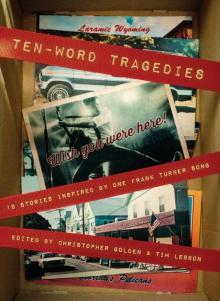 Ten-Word Tragedies
Ten-Word Tragedies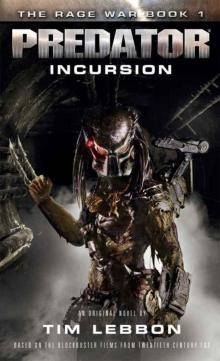 Predator: Incursion
Predator: Incursion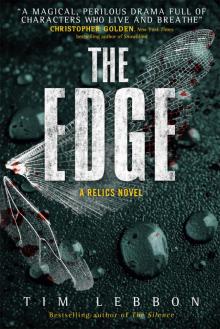 Relics--The Edge
Relics--The Edge Firefly
Firefly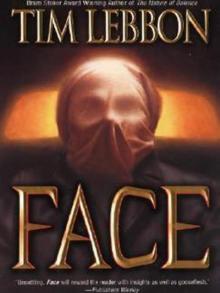 Face
Face Generations
Generations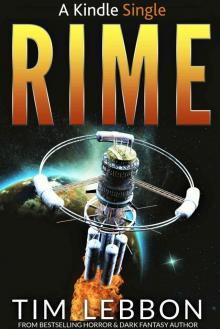 RIME (Kindle Single)
RIME (Kindle Single) Fallen
Fallen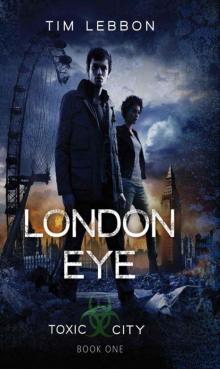 London Eye tc-1
London Eye tc-1 Kong: Skull Island
Kong: Skull Island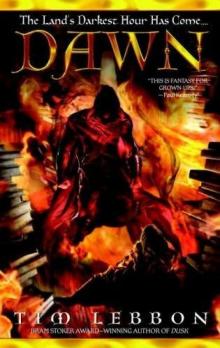 Dawn n-2
Dawn n-2 Into the Void: Star Wars (Dawn of the Jedi)
Into the Void: Star Wars (Dawn of the Jedi)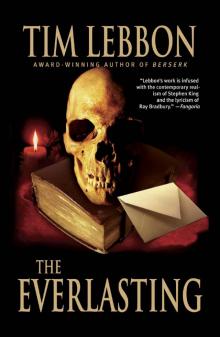 The Everlasting
The Everlasting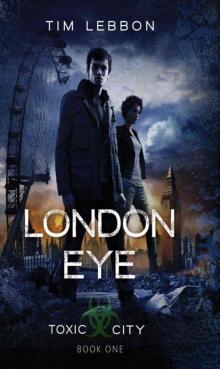 London Eye: 1 (Toxic City)
London Eye: 1 (Toxic City)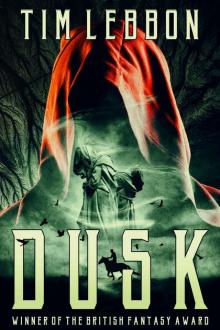 Dusk: a dark fantasy novel (A Noreela novel)
Dusk: a dark fantasy novel (A Noreela novel)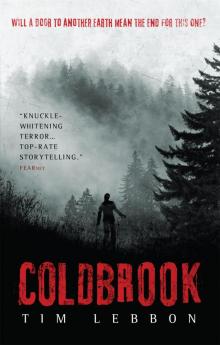 Coldbrook
Coldbrook Alien
Alien Dusk
Dusk The Cabin in the Woods
The Cabin in the Woods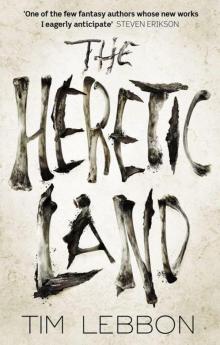 The Heretic Land
The Heretic Land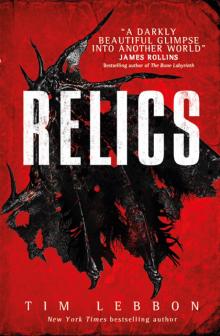 Relics
Relics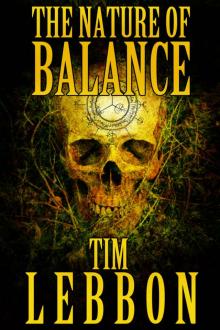 The Nature of Balance
The Nature of Balance Echo City
Echo City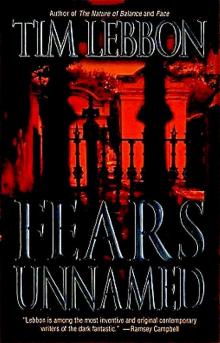 Tim Lebbon - Fears Unnamed
Tim Lebbon - Fears Unnamed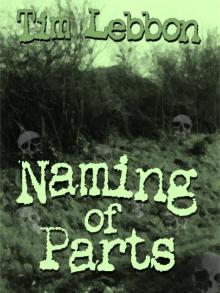 Naming of Parts
Naming of Parts Alien--Invasion
Alien--Invasion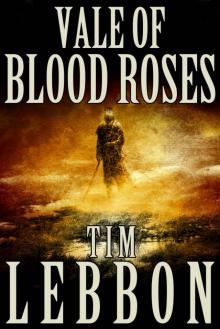 Vale of Blood Roses
Vale of Blood Roses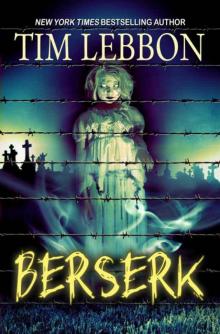 Berserk
Berserk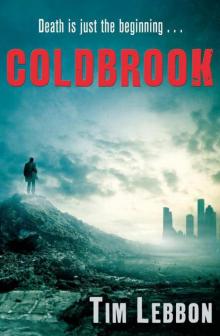 Coldbrook (Hammer)
Coldbrook (Hammer)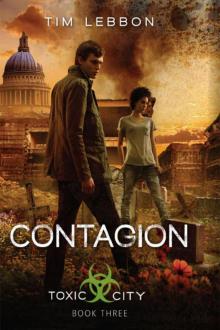 Contagion tc-3
Contagion tc-3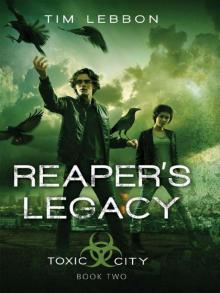 Reaper's Legacy: Book Two (Toxic City)
Reaper's Legacy: Book Two (Toxic City)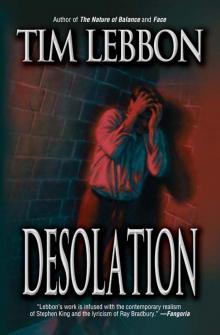 Desolation
Desolation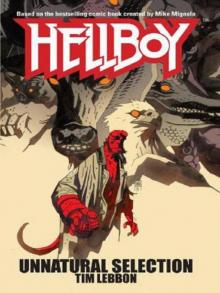 Unnatural Selection
Unnatural Selection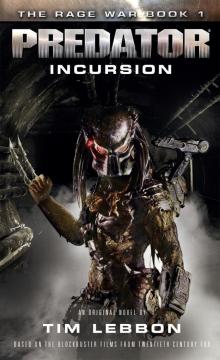 Predator - Incursion
Predator - Incursion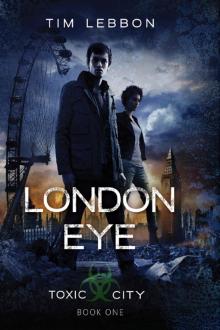 London Eye
London Eye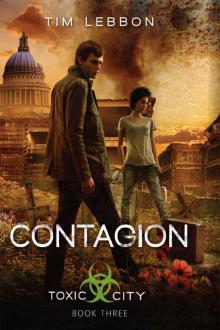 Contagion (Toxic City Book Three)
Contagion (Toxic City Book Three) The Silence
The Silence The Thief of Broken Toys
The Thief of Broken Toys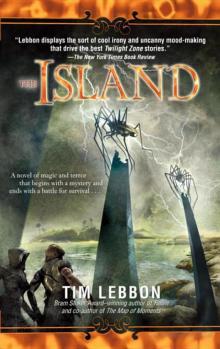 Tales of Noreela 04: The Island
Tales of Noreela 04: The Island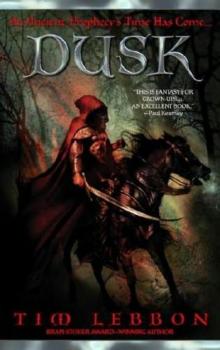 Dusk n-1
Dusk n-1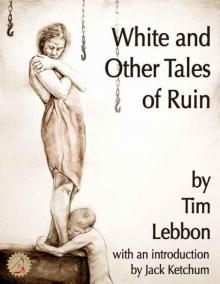 White and Other Tales of Ruin
White and Other Tales of Ruin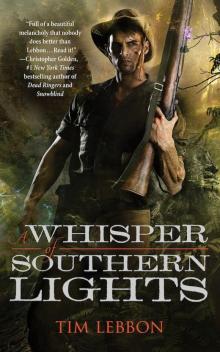 A Whisper of Southern Lights
A Whisper of Southern Lights Until She Sleeps
Until She Sleeps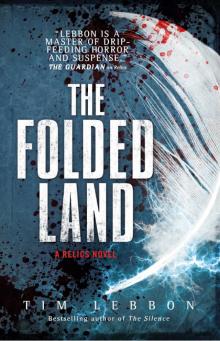 Relics--The Folded Land
Relics--The Folded Land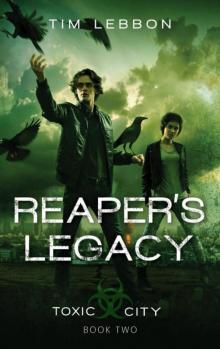 Reaper's Legacy tc-2
Reaper's Legacy tc-2 Alien: Out of the Shadows
Alien: Out of the Shadows Pieces of Hate
Pieces of Hate X-Files: Trust No One
X-Files: Trust No One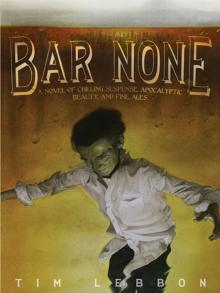 Bar None
Bar None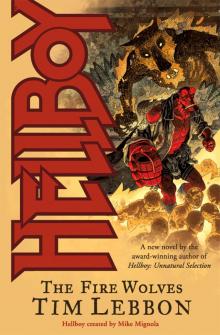 The Fire Wolves
The Fire Wolves